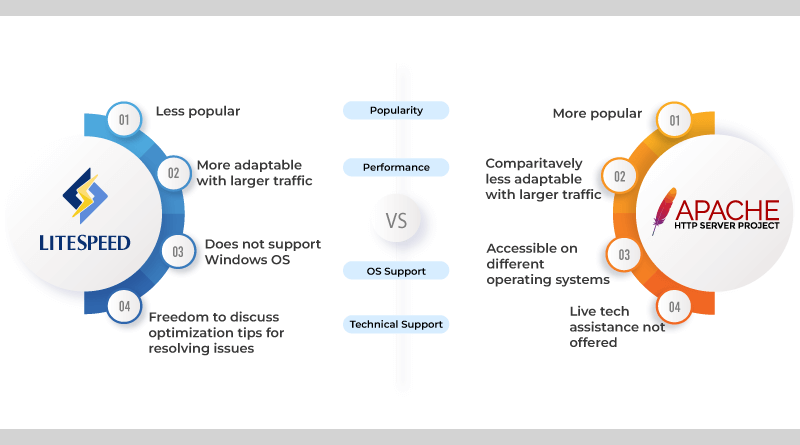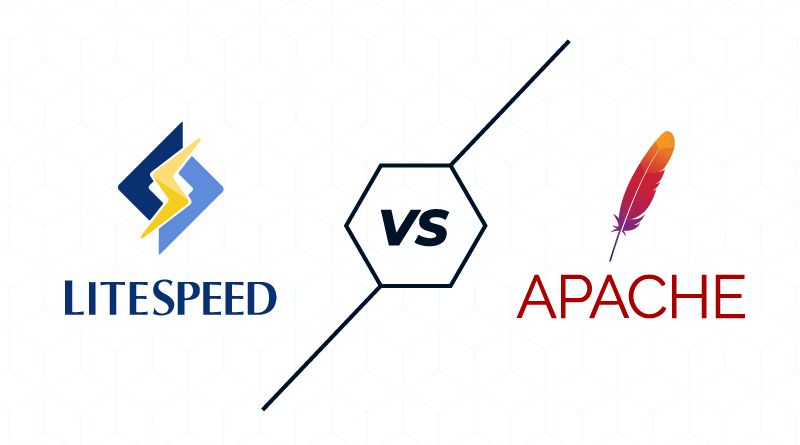You are reading this blog on the web hosting service provider MilesWeb website. Did you know the fundamental element of running these operations? It is the server and doesn’t assume that only one kind of server is responsible for making web hosting operations accessible. LiteSpeed and Apache are two major server categories and in this blog we will be discussing them. Thus, we brought this LiteSpeed vs Apache blog for you.
MilesWeb offers website hosting Apache servers compatible with LiteSpeed. But remember that LiteSpeed vs Apache is a huge topic to debate on. It is because both are different concepts, and we bet that many users are unaware of them. Thus, LiteSpeed server vs Apache is a popular topic among the web hosting user’s community.
If you also belong to the same community, this LiteSpeed Web Server vs Apache is for you. We have published more blogs in this category “How Can You Speed Up Your Website with LiteSpeed?” and “Understanding a Web Server and Types of Web Servers.”
In the server blogs series, this is the next edition to read. Let’s dive in!
Table of Content
What is a Web Server?
A simple piece of hardware and software connected through relevant hardware deals with clients’ requests. And as a final result, clients get search result pages according to their query. The web server can host multiple websites as a machine depending on which hardware they use.
Now, don’t assume that the client would be only a person. Here we refer to clients as a device like smartphones, smartwatches, IP cameras, laptops, or the PC. These devices fetch queries from the user and request data from a web server. Then, the web browser displays the search results for the requested query. Even you are reading this blog because you searched the query for LiteSpeed Web Server vs Apache, and our hosting server displayed the same within milliseconds.
Web servers have existed since the internet occurrence. NeXT Computer workstation in 1990 was the first web server, and all credit goes to Tim Berners Lee. He included all Internet protocols in the server and used an Ethernet setup for the internet connectivity. Along with time, the internet evolved, and nowadays, we are using cloud hosting or cloud databases to store data.
MilesWeb also embraces advancements; thus, we have Apache servers with LiteSpeed for robust performance of websites and different types of web applications. Features like mod_rewrite, .htaccess, and mod_security ensure rock-solid security to keep web servers away from vulnerable cyberattacks.
It’s time to move on to two different technologies, Apache and LiteSpeed, that are here to stay in the web hosting industry.
What is Apache?
Apache, the industry-leading open-source web server, was created in 1995 by Rob McCool and Brian Behlendorf. These servers hold a significant market share. That is why many web hosting companies like MilesWeb leverage these servers. One point we would like to highlight is that these servers are compatible with Linux operating systems.
Hence, many Linux distros have pre-installed Apache technologies. Given that it is already installed, this makes it simple to get started. Let’s not forget that HTTP, the main internet protocol, is also the name of the Linux process that Apache operates as, HTTPD, also known as the HTTP Daemon.
What is LiteSpeed?
LSWS, or the LiteSpeed Web Server, is a new kind of server technology emerging nowadays. These servers meet scalability and flexibility demands for websites. LSWS works faster than Apache, which is also a popular web server software in the website hosting market. Fine-tune website performance, caching, compressing and the security factor are some major USPs of LSWS. This advancement helped in doubling the server capacity of websites on their servers. Moreover, if you want to know about its USPs, its streamlined architecture helps in enhancing the server’s efficiency.
Another factor that adds up the efficiency value of servers is advanced caching techniques, an optimized codebase and a content delivery speed 50 times faster than Apache. LiteSpeed was introduced in 2003, eight years after Apache. You will get lots of visitors, and the content delivery speed will be faster.
MilesWeb is a trusted web hosting company providing appropriate web hosting solutions. Our servers are Apache with LiteSpeed. Thus, clients get maximum website performance and a higher ROI from their hosting experience.
Related: How Can You Speed Up Your Website With LiteSpeed?
LiteSpeed vs Apache: Outlining Differences

1. Popularity
In terms of market share debate between Apache vs LiteSpeed, Apache takes the lead in comparison with LiteSpeed. Apache, since it was launched, it captured a whooping market share. Due to the late arrival of LiteSpeed, the market share is lesser but significant. According to some reports, more than 30% of the market share is captured by Apache.
LiteSpeed hosts less number of websites and captures around 5% to 10% of the market share. One more competitor is there of these two NGINX. We have discussed the same in the LiteSpeed vs Nginx blog some other day; let’s stay focused on LiteSpeed vs Apache.
2. Performance
LiteSpeed is much more adaptable with larger traffic and concurrent connections thanks to its asynchronous nature. The technique takes advantage of intelligent caching, which allows the system to keep compressed cache files rather than generating new requests each time a user attempts to access them.
By doing this, LSWS is able to boost the PHP server’s performance by 50%, making it, in the end, up to six times faster than Apache for static content. Additionally, LiteSpeed performs wonders when it comes to page compression, so that is a benefit.
In this manner, every new request is processed more quickly and uses less RAM. LiteSpeed clearly lives up to its name; static websites can benefit from LSWS significantly more than they do with the default Apache server configuration.
3. OS Support
Another crucial aspect that you must not ignore is the operating system’s configurations. Linux servers hold a massive market share in the web hosting industry. Apache supports all Linux distributions, versions and instances like Fedora, Ubuntu and others. And not just that, its current versions support Windows, OpenVMS, and a wide variety of Unix-like systems.
Therefore, Apache is accessible on different operating systems. But LiteSpeed does not support Windows OS. Windows systems require extensive reconfiguration of the current configuration because they differ greatly from Unix-like solutions.
4. Technical Support
In the website hosting operations, users can’t imagine it without technical support. Even MilesWeb offers 24×7 tech support to make the web hosting experience better for customers. Hence, as far as the technical documentation is concerned, LiteSpeed has a better technical community to support novice users.
Not just the dedicated forums, LSWS have their own groups in Slack and Facebook. As a user, you have the freedom to discuss optimization tips for resolving issues.
There isn’t any live tech assistance offered by Apache. The community is your greatest hope for live support because the software is open-source. LiteSpeed, in contrast, is a commercial product. Therefore, they properly provide specialized support. From your user area, you may quickly file a help request, and the operators are typically helpful.
LiteSpeed vs Apache: The Verdict
In conclusion, both LiteSpeed and Apache are popular web server software options, each with its own strengths and weaknesses.
LiteSpeed is known for its exceptional performance and efficiency, offering high-speed handling of concurrent connections and advanced caching mechanisms. It is designed to be a drop-in replacement for Apache, which means it can work seamlessly with existing Apache configurations. LiteSpeed also provides comprehensive security features, including built-in anti-DDoS protection and enhanced SSL/TLS performance.
On the other hand, Apache is a highly versatile and widely adopted web server that has been around for a long time. It offers a rich set of features and extensive community support. Apache is known for its flexibility and compatibility with various modules and configurations. It is often the go-to choice for complex setups or environments that require extensive customization.
Ultimately, the choice between LiteSpeed and Apache depends on your specific needs and priorities. If performance and scalability are paramount, LiteSpeed may be the better option. On the other hand, if you require extensive customization options, compatibility with existing modules, or prefer a more established and widely supported solution, Apache may be the preferred choice.
It’s worth noting that LiteSpeed is a commercial product with certain licensing fees, while Apache is open-source and freely available. Therefore, budget considerations may also play a role in your decision-making process. Overall, both LiteSpeed and Apache are reliable web server options, and the final verdict should be based on careful evaluation of your requirements, performance expectations, and budget constraints.
FAQs- LiteSpeed vs Apache
What is the main difference between LiteSpeed Web Server and Apache?
The main difference between LiteSpeed Web Server and Apache lies in their performance and resource efficiency. LiteSpeed is designed to handle more concurrent connections with lower memory usage and faster processing speeds compared to Apache, making it a preferred choice for high-traffic websites.
Is LiteSpeed Web Server compatible with Apache configurations and modules?
Yes, LiteSpeed Web Server is compatible with Apache configurations and modules. It supports .htaccess files, mod_rewrite, and mod_security, ensuring a smooth transition for users migrating from Apache without needing to alter their existing configurations.
Does LiteSpeed Web Server offer better performance than Apache?
LiteSpeed Web Server offers significantly better performance than Apache. It is known for its superior speed, especially under heavy loads, due to its event-driven architecture, efficient resource management, and advanced caching mechanisms.
Are there any drawbacks to using LiteSpeed Web Server over Apache?
One potential drawback of using LiteSpeed Web Server over Apache is cost. LiteSpeed is a commercial product with licensing fees, whereas Apache is open-source and free. However, the performance benefits often outweigh this cost for many users.
Can I easily migrate from Apache to LiteSpeed Web Server?
Yes, migrating from Apache to LiteSpeed Web Server is relatively easy. LiteSpeed is designed to be a drop-in replacement for Apache, allowing you to use existing configurations and modules, minimizing downtime and simplifying the transition process.















